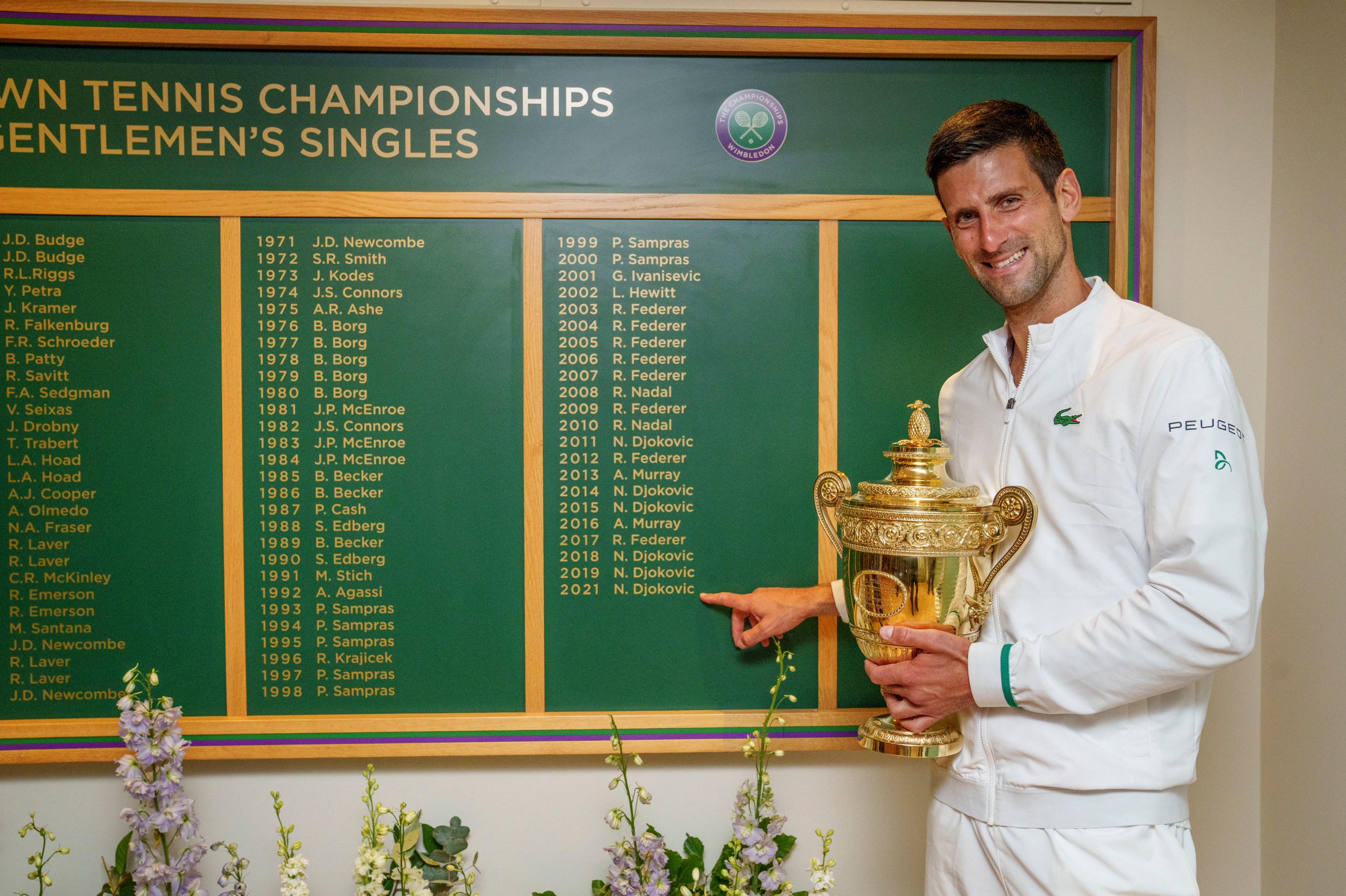For the clearest vision of the future, look not to science fiction or technical white papers, but to Novak Djokovic casually beating up on a gifted 20-something who has otherwise demonstrated mastery over the surface they're playing on. Three majors into the 2021 season, this has been the one constant. The latest hopeful was No. 7 seed Matteo Berrettini, who entered Sunday's Wimbledon final fresh off an 11-match grass court win streak and a title at Queens, only to lose 6-7(4), 6-4, 6-4, 6-3.
Last month at Roland Garros it was Stefanos Tsitsipas, playing in his third final of an impressive clay season, who went up two sets on Djokovic only to be undone in five. In February at the Australian Open, it was Daniil Medvedev, who in summer 2019 broke out as the next master of hard court and entered his final against Djokovic with a 20-match win streak. These last two in particular are the most promising players of their generation. In all of these cases, on all of these surfaces, the man who just claimed his 20th major title—tying rivals Roger Federer and Rafael Nadal—represented a step up in difficulty that the kids could not manage. There's beating the remainder of the tennis-playing population of Earth, and then there is beating the current world No. 1 in a best-of-five. Lately I have nodded along as people new to tennis liken Djokovic to the ocean, or to gravity, or to some other insuperable and inevitable fact of nature. It's hard to envision this coming to an end.
Berrettini can be proud that he made the match a little more competitive than I had expected. Thanks to his gargantuan serve and forehand, and a solid slice that can cover for a mediocre two-handed backhand, grass courts have been good to his game, as his 27-7 career record attests. The staple carb of contemporary men's tennis is a serve that pulls the opponent out of position and a forehand ripped into the resulting empty space on the court; it rarely looks better than when Berrettini is doing it on a fast surface. The Italian stumbled in the first few games of the final, then found his form later in the set. It also helped his cause that in each of his last two major finals, Djokovic has been a bit slow to boot up the unbeatable tennis machine. In a dicey first set he went up a break, flinched and let the lead go, allowing Berrettini to escape with a focused first-set tiebreak.
From that point forward, however, Djokovic took control by neutralizing Berrettini's biggest weapon, a serve that regularly breaks 130 mph, with the greatest returning the game's ever seen. Djokovic pounced on serves any other player would be lucky to touch, and not only blocked them back into the court but directed them with malicious intent, deep into Berrettini's backhand. Later in the match, on his own serve, having discovered that Berrettini was uncomfortable attacking a slower ball on his backhand, Djokovic began to roll off-speed second serves into that wing. Berrettini, who's a ferocious enough server to hit multiple second-serve aces in this match, still won only 38 percent of second-serve points, which is not a workable number for him.
Berrettini is not a difficult tennis player to scout—if a tennis court was half as wide and the sport consisted only of forehands he'd be a happy man—but an opponent is lucky to get a set or two before Djokovic has sussed out what makes them uncomfortable. After that it's a matter of execution, and against any less a foe than, say, Rafa on clay—which demands at least a spell of fully alien tennis—Djokovic seems able to pull off the victory at some 80 percent of his full ability. Which is not to say the alien stuff doesn't make an occasional appearance:
Leaving us speechless, @DjokerNole. #Wimbledon pic.twitter.com/YTMw1YLXTT
— Wimbledon (@Wimbledon) July 11, 2021
It's just that he rarely needs to dig that deep, because he has such a reliable and reproducible formula for winning points, and better physical and mental conditioning than everyone else to boot. Riding a 21-match streak in the tournaments that he said matter most to him, he says he is a 50-50 to play the Olympics; the more pressing objective might be to do something neither Federer nor Nadal has done, and win all four majors in a calendar year. Neck-and-neck with their past feats, he could soon push into a future where he stands alone, and no one left is good enough to test him.






